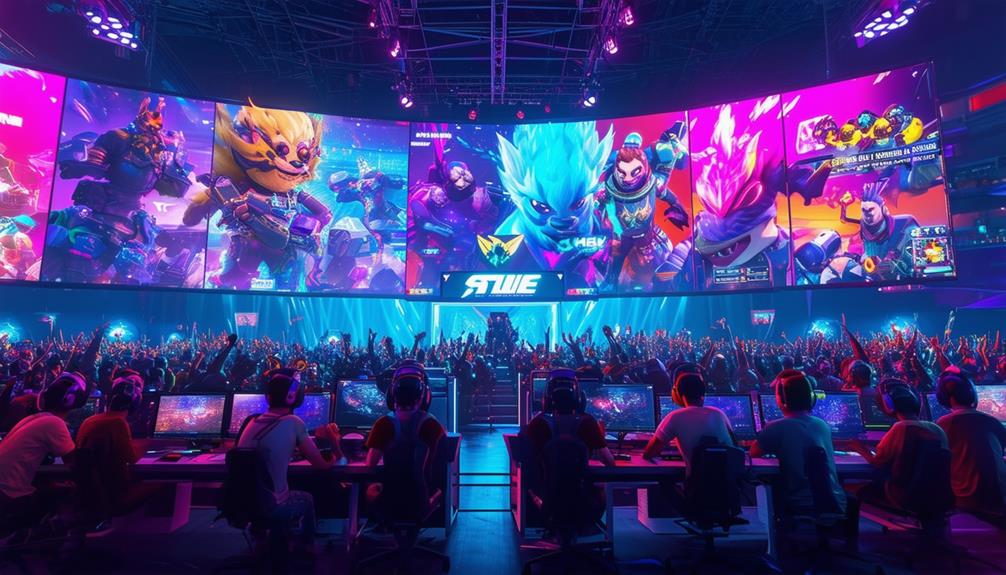The Role of Coaches and Analysts in Esports
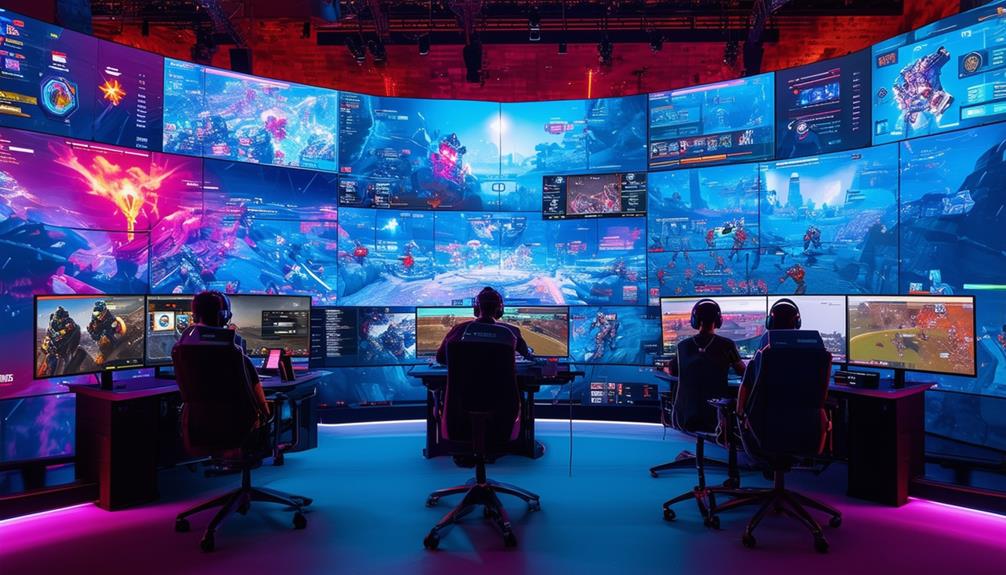
When considering esports, the focus often lands on the players, but it's crucial to recognize the vital roles that coaches and analysts play. These professionals are the unsung heroes, responsible for shaping strategies and refining player skills.
Coaches develop game plans and make quick decisions to give their teams a competitive edge, while analysts delve into data to identify areas for improvement. This collaborative effort ensures that teams are not only well-prepared but also adaptable in the fast-paced world of esports.
Interested in learning how they accomplish this and what their daily routines entail?
Key Takeaways
- Coaches develop game strategies, analyze opponents, and provide real-time decision-making guidance during matches.
- Analysts use data to monitor performance metrics, identify patterns, and offer insights for gameplay optimization.
- Coaches enhance player skills through personalized training programs and continuous feedback.
- Analysts and coaches collaborate to understand and adapt to the evolving game meta, providing strategic advantages.
- Effective scouting by coaches identifies emerging talent based on performance metrics, adaptability, and teamwork capabilities.
Defining Esports Coaching
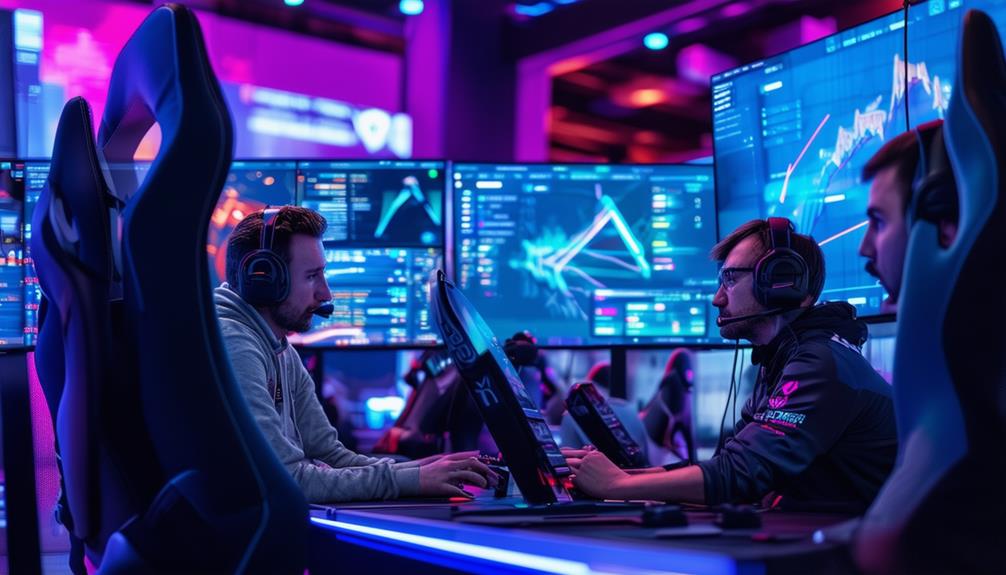
Esports coaching involves guiding and mentoring gamers to enhance their skills and performance. In the realm of competitive esports, coaches play a crucial role. Their responsibilities extend beyond gameplay; they encompass strategy development, gameplay analysis, and providing critical feedback to help teams succeed.
A coach's influence in the high-stakes world of esports can be the deciding factor between victory and defeat. They're integral to talent development, identifying individual strengths and weaknesses to ensure each gamer can maximize their potential.
Additionally, coaches are vital for fostering team dynamics. They facilitate effective communication, build trust, and ensure seamless collaboration. These elements are essential in an environment where teamwork and quick decision-making are pivotal.
Strategic Role of Coaches
Coaches play a pivotal role in shaping a team's success by developing game plans, refining player skills, and making crucial in-game decisions. They meticulously craft strategies to give the team a competitive edge while continuously working on individual player improvement. Moreover, coaches provide essential guidance to make the right decisions during matches, ensuring the team maintains a strategic advantage.
Game Plan Development
Coaches are crucial in formulating game plans and strategies that enhance team performance in esports competitions. They meticulously analyze opponents' gameplay patterns to identify strengths and weaknesses, crafting tailored strategies for each match. This ensures that the team remains one step ahead of the competition.
Key aspects of game plan development include:
- Opponent Analysis: Coaches scrutinize the gameplay of opposing teams to uncover habits and tendencies. This detailed analysis helps anticipate opponents' moves and develop effective counter-strategies.
- Team Coordination: Effective game plans rely on seamless teamwork. Coaches collaborate with players to ensure everyone understands their roles and the overarching strategy, fostering unity and coordination.
- Tactical Implementation: During matches, coaches guide players in executing the planned strategies and make real-time adjustments based on the evolving dynamics of the game.
- Creative Strategies: Innovative game plans devised by coaches can provide a competitive edge, especially in critical moments.
Your team's success depends on the strategic insights and real-time decision-making of your coach, enabling you to outmaneuver opponents and secure victories in high-stakes esports tournaments.
Player Skill Enhancement
By leveraging personalized training programs, coaches play a pivotal role in honing each player's unique skills and addressing their individual weaknesses. Player development in esports hinges on these tailored approaches. Coaches meticulously analyze game footage, pinpointing areas where improvement is needed and capitalizing on strengths. This isn't just about generic advice; it's about crafting a plan that suits each player perfectly.
The beauty of personalized training programs lies in their specificity. They allow coaches to focus on individual strengths and weaknesses, ensuring that every session is targeted and efficient. As players refine their techniques and adapt to the constantly changing game meta, they find themselves excelling in competitive matches more consistently.
In addition to skill refinement, coaches' feedback and guidance are invaluable. They help players stay motivated and cohesive with their team, fostering a culture of continuous improvement. With their leadership, both individual performance and overall team success improve. Coaches continuously monitor progress, optimize team line-ups, and make data-driven decisions, all contributing to player growth and success in the dynamic world of esports.
In-game Decision Making
In the heat of competition, strategic in-game decisions can make or break a match, with coaches playing a critical role in guiding these choices. Coaches aren't merely on the sidelines; they're essential in analyzing strategies, making real-time adjustments, and ensuring the team leverages its strengths. Their influence extends beyond pre-game preparations into every moment of gameplay.
Coaches assist players in making crucial decisions, such as:
- Map Control: Directing players on optimal positioning to dominate key areas.
- Objective Prioritization: Determining which objectives to target for competitive advantage.
- Counter Strategies: Analyzing opponent tactics to devise effective counters.
- Synergy and Strengths: Maximizing individual player talents to enhance overall team performance.
Player Development
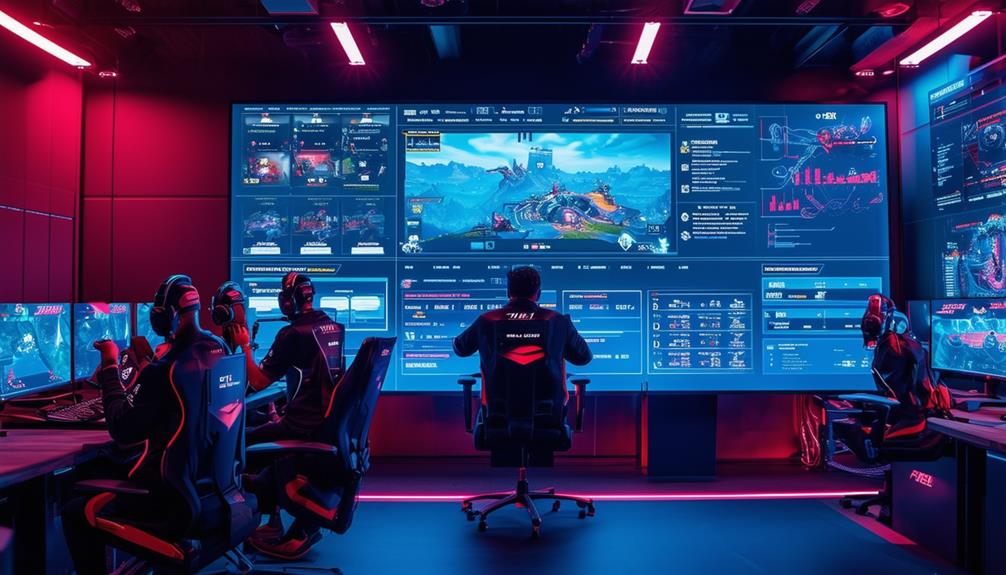
The Role of Coaches
Coaches in esports focus on honing your skills, enhancing teamwork, and fostering strategic thinking. They offer individualized feedback and customize training programs to maximize your performance. By working closely with you, coaches refine your techniques, improve your in-game decisions, and bolster your overall gameplay.
The Role of Analysts
Analysts leverage data-driven insights to monitor your progress, identifying your strengths and areas for improvement. They break down gameplay footage, analyze statistics, and provide actionable advice to elevate your game. Understanding performance metrics allows analysts to help you make informed adjustments to your strategies.
Collaborative Efforts
Together, coaches and analysts play a crucial role in your development. Coaches build strong foundational skills and teamwork, while analysts offer the critical data that drives improvement. This collaborative approach not only enhances your abilities but also contributes to team success. In esports, player development relies heavily on the combined expertise and support of both coaches and analysts.
Talent Scouting
When scouting talent in esports, it's crucial to identify emerging players and evaluate their potential. Utilize a combination of data analysis, game knowledge, and direct observation to assess how well these players can integrate into your team's strategy. Effective scouting methodologies will provide your team with a significant competitive advantage.
Identifying Emerging Talent
Spotting emerging talent in esports requires a keen eye and a deep understanding of game dynamics. As a coach or analyst, your role in talent scouting is crucial for identifying players who can enhance your team's performance. Leveraging data-driven insights, you can evaluate players' skills, gameplay styles, and strategic prowess. Here's how you can excel in identifying emerging talent:
- Analyze Performance Metrics: Examine detailed statistics such as kill/death ratios, assists, and objective control. These metrics provide a quantitative measure of a player's abilities.
- Observe Gameplay Styles: Pay attention to how players navigate different scenarios. Unique gameplay styles and innovative strategies can signal a player's potential to disrupt the meta and introduce fresh tactics.
- Evaluate Teamwork Capabilities: Identify players who excel in communication and coordination. Exceptional teamwork skills are vital for maintaining harmony and efficiency within a team.
- Spot Consistency and Adaptability: Look for players who consistently perform well under pressure and can adapt to changing game dynamics. These traits are essential for success in high-stakes tournaments.
Effective talent scouting goes beyond finding skilled players; it's about uncovering future stars who can lead your team to victory.
Evaluating Player Potential
Evaluating player potential in esports requires a comprehensive approach involving in-game performance, strategic thinking, and team compatibility. As a coach or analyst, it's essential to look beyond raw skill. Start by observing how a player performs under pressure during matches. Are they making smart decisions? Do they communicate effectively with their teammates? These are key indicators of their ability to function within a team.
Additionally, analyze gameplay footage and statistics. Analysts play a crucial role by breaking down the numbers and identifying patterns or weaknesses in a player's game. This data-driven approach helps pinpoint areas for improvement and assess player potential.
Adaptability is also significant. Esports is fast-evolving, and a player's ability to adjust to new strategies or meta changes can be a game-changer. Coaches should evaluate this by putting players through different scenarios to see how they adapt.
Scouting Methodologies
Effective talent scouting in esports relies on a thorough assessment of individual skills, communication abilities, and teamwork dynamics. As a coach or analyst, you need to delve into these key areas to identify players who can elevate your team's performance. Here's a structured approach:
- Individual Skills: Evaluate players' mechanical prowess, reaction times, and game-specific techniques. Utilize data analysis to track performance metrics and uncover standout talents.
- Communication Abilities: Monitor how players interact with teammates during games. Strong communication is essential for executing strategies and ensuring team cohesion.
- Teamwork Dynamics: Assess how well a player integrates into your team's existing framework. This includes observing their cooperation in high-pressure scenarios and adaptability to different roles.
- Data Analysis: Leverage advanced analytics to analyze consistency and impact over time. Tools and software can reveal trends, aiding in more informed decision-making.
This methodology ensures a comprehensive and accurate evaluation process, enhancing your ability to scout top-tier talent.
Game Meta Analysis
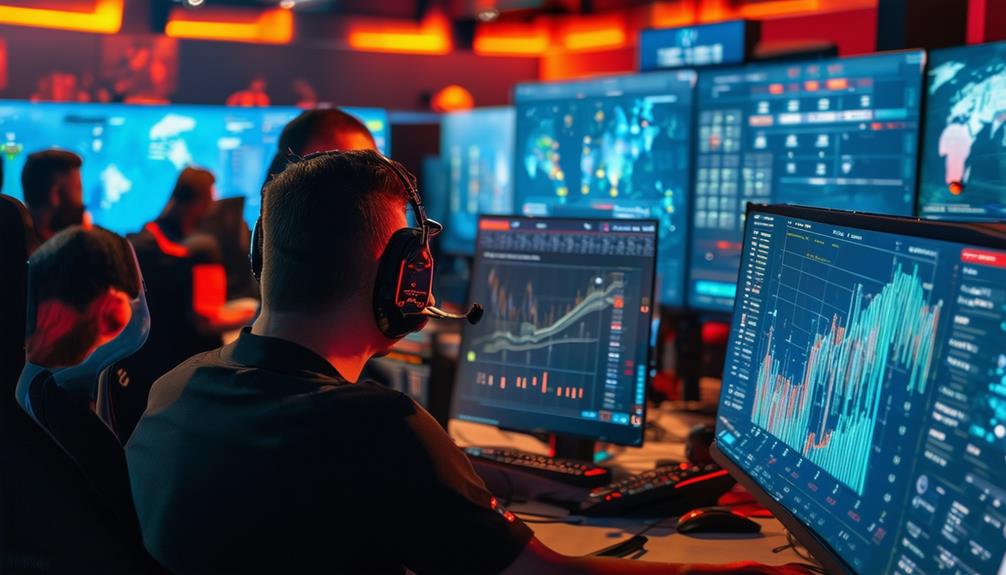
Game meta analysis involves examining current trends and strategies to help your team gain a competitive edge in their esports title. Coaches and analysts collaborate to study the game meta, understanding the most effective strategies and counter-strategies used by top players and teams. By doing so, they can adapt their team's gameplay, improve performance, and keep up with the constantly evolving esports landscape.
When delving into game meta analysis, the focus is on identifying the strengths and weaknesses of different strategies. This knowledge allows coaches and analysts to make informed decisions on drafting, team composition, and in-game tactics, ensuring the team is always a step ahead.
Here's a quick breakdown:
| Role | Focus Area | Outcome |
|---|---|---|
| Coaches | Team adaptation | Enhanced performance |
| Analysts | Meta trends and strategies | Informed decisions |
| Game Meta | Current strategies | Competitive advantage |
Understanding the game meta is crucial for identifying areas where your team can improve. It highlights strengths to capitalize on and weaknesses to address, ultimately enhancing your team's gameplay and keeping you at the forefront of competition.
Role of Analysts
Analysts in esports play a crucial role by providing data-driven insights that inform strategic decisions and gameplay improvements. They meticulously review game footage and track player statistics to identify strengths and weaknesses essential for strategic enhancements. The success of your team depends on the actionable insights they deliver.
Key contributions of analysts include:
- Data Analysis: Analysts delve into game data to identify patterns and trends, helping to determine effective strategies and areas needing improvement.
- Game Performance Evaluation: By reviewing past matches, analysts highlight areas of excellence and pinpoint aspects requiring more focus.
- Player Statistics: Analysts monitor and interpret player-specific data, offering detailed breakdowns of individual performance, which aids in tailored training sessions and role assignments.
- Communication: Through comprehensive reports and presentations, analysts effectively convey their findings, ensuring team alignment and informed decision-making.
Focused on data analysis and performance tracking, analysts help your team remain competitive in the evolving esports landscape. They provide coaches and players with valuable insights, significantly contributing to gameplay optimization and overall team performance.
Data-Driven Decisions
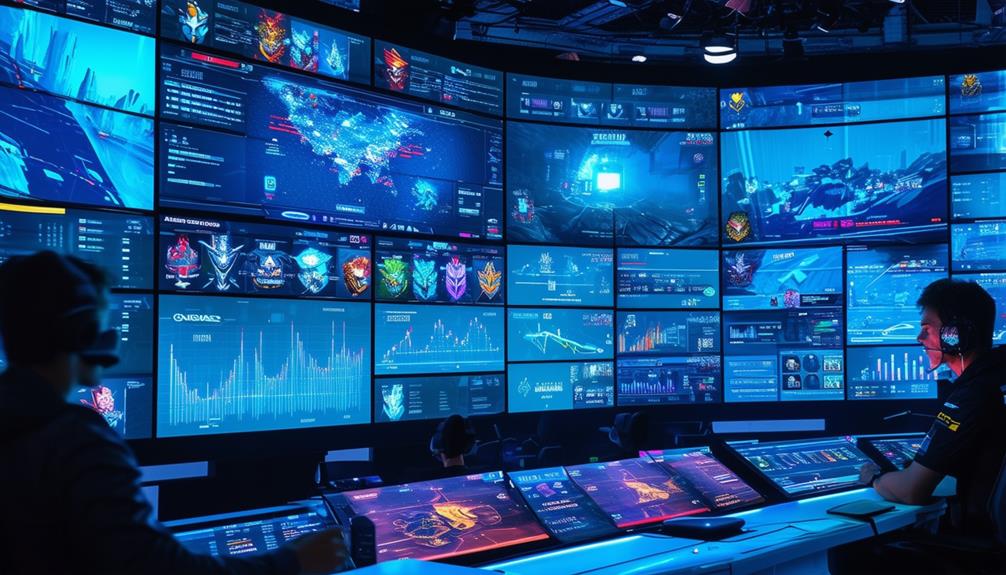
Tracking performance metrics enables real-time strategic gameplay adjustments, potentially altering the course of a match. Coaches and analysts use data to identify strengths, weaknesses, and opportunities for improvement. Leveraging these insights can optimize team strategy and enhance overall performance.
Performance Metrics Tracking
Tracking performance metrics like K/D ratios and CS per minute enables coaches to make data-driven decisions that can significantly impact esports matches. By analyzing these metrics, you can accurately assess player contributions, identify strengths and weaknesses, and make informed adjustments in real-time. Here's how this benefits your team:
- Real-Time Insights: Performance metrics provide immediate feedback on player performance, allowing for quick tactical adjustments during a match.
- Weakness Identification: Data-driven analysis helps pinpoint areas where players or the team are struggling, focusing your efforts on targeted improvements.
- Strength Recognition: Metrics highlight what's working well, enabling you to capitalize on your team's strengths and refine your strategies.
- Enhanced Communication: Understanding individual contributions through data fosters better team communication and dynamics.
Advanced analytics tools further enrich this process by offering detailed examinations of team dynamics and communication patterns.
The ability to track and interpret these performance metrics is crucial, often determining the difference between a good team and a great one. Leveraging these data-driven insights allows for continuous strategy refinement, keeping you ahead of the competition.
Strategic Gameplay Adjustments
By leveraging data-driven decisions, coaches can make strategic gameplay adjustments that directly improve team performance and influence match outcomes. Analyzing game footage helps identify patterns, weaknesses, and areas needing improvement. Coaches and analysts delve into this data to craft strategies that optimize both team and individual player performance.
Imagine you're preparing for a critical match. Your analysts have reviewed hours of gameplay, pinpointing your opponent's tendencies and your team's vulnerabilities. With these insights, coaches can devise targeted plans to counteract the opposing team's strengths while addressing your weaknesses. This is a precise, data-backed approach to strategy, not mere guesswork.
Data-driven decisions extend beyond game footage. Statistical insights reveal which plays work best under specific conditions, enabling coaches to tweak in-game tactics on the fly. For instance, if data shows a particular strategy consistently failing against certain opponents, coaches can make real-time adjustments to avoid repeating mistakes.
In the fast-paced world of esports, staying ahead requires more than just raw talent. Effective coaches and analysts use data-driven decisions to transform information into winning strategies, ensuring your team remains competitive and ready for any challenge.
Team Preparation
Effective team preparation in esports relies on strategic planning, rigorous practice, and insightful analysis. As a coach, your role is to create practice schedules, drills, and strategies that enhance player skills, teamwork, and coordination.
Analysts focus on deep data dives to provide insights into player performance, team dynamics, and gameplay trends. Together, these efforts ensure the team is well-prepared for any opponent.
To optimize team preparation, consider the following:
- Analyze Opponents: Study opponent strategies to identify weaknesses and devise effective counter-strategies.
- Data-Driven Insights: Utilize analysts' data to identify trends and areas for improvement, aiding informed decision-making during practice and matches.
- Tailored Practice Schedules: Design practice sessions that address specific needs, focusing on individual skill development and team synergy.
- Player Feedback: Regularly gather and incorporate player feedback to refine strategies and ensure alignment within the team.
Career Pathways
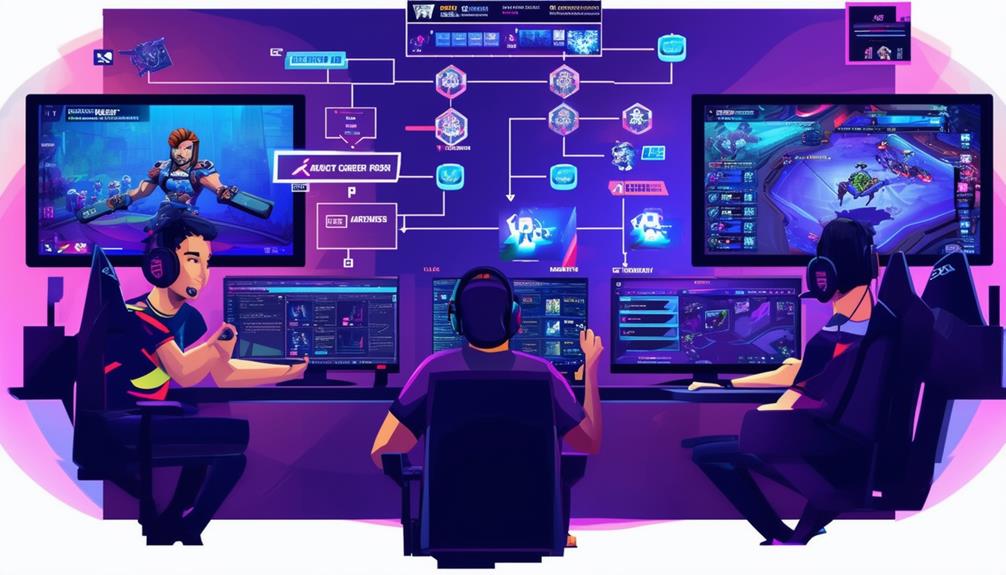
Starting a career in esports coaching offers a dynamic pathway filled with opportunities for growth and specialization. You might begin as an assistant coach or analyst, gaining valuable experience and building your reputation within esports teams. As you hone your skills, you can progress to a head coach or even a managerial role, overseeing diverse aspects of team performance and strategy.
Beyond esports teams, educational institutions increasingly offer programs designed to prepare students for careers in esports coaching and management. These programs provide a solid foundation and can lead to roles within educational esports programs, where you can mentor aspiring players and help develop the next generation of talent.
There is also a growing demand for skilled coaches and analysts within esports organizations and leagues. These roles can lead to exploring event coordination, content creation, and various management positions. The industry's expansion means more opportunities to specialize and carve out a niche that aligns with your interests and expertise.
With the rising need for qualified professionals, career pathways in esports coaching are promising and varied, offering numerous avenues to advance and diversify your skill set.
Future Trends
As you explore the diverse career pathways in esports coaching, it's crucial to stay informed about future trends that will shape the industry.
Esports coaches and performance analysts are on the cusp of significant transformation due to several emerging trends.
- Specialized Roles: Expect an increase in specialized coaching roles, such as mental health coaches and performance analysts. These positions will offer targeted support to help teams and players address specific needs.
- Technology Integration: AI and data analytics will play a growing role in coaching, providing insights into player performance and game dynamics. This technology will enable coaches to develop more effective strategies.
- Adaptability: Remaining competitive requires adapting to evolving game dynamics and meta shifts. Coaches and analysts must be flexible and continuously update their strategies to keep pace with the rapidly changing gaming landscape.
- Investment in Coaching: Esports organizations are increasingly investing in coaching staff, recognizing the importance of support systems for achieving success in competitive gaming.
As the esports industry continues to grow, the demand for skilled coaches and analysts will rise. Staying informed about these trends will help you build a successful career in this dynamic field.
Frequently Asked Questions
What Is the Role of a Coach in Esports?
As an esports coach, you lead player training, develop strategies, and mentor to enhance skills. You create practice schedules, scout talent, and focus on player development. You build team culture, promote teamwork, and provide leadership while analyzing game footage for data-driven insights.
What Does an Esports Analyst Do?
As an Esports Analyst, you review game footage, track player statistics, and analyze strengths and weaknesses. You generate data-driven reports and presentations to assist coaches and players in refining strategies and optimizing gameplay. Your insights directly contribute to enhancing team performance.
What Does a Coach Analyst Do?
As a coach analyst, you analyze game footage, track player performance, and provide data-driven insights. You create detailed reports and presentations to effectively communicate your findings and support the coaching staff. Your strategic recommendations are crucial for enhancing gameplay and contributing to the team's overall success.
How Do You Coach an Esport Team?
To coach an esports team effectively, develop comprehensive training programs, analyze gameplay footage, and devise strategic plans tailored to your team's strengths and weaknesses. Provide constructive feedback and motivation, manage team dynamics, and foster a collaborative environment. Stay updated with the evolving meta and promote a positive team culture to ensure long-term success.
Conclusion
In esports, the impact of coaches and analysts is pivotal. They develop strategies, refine player skills, and make data-driven decisions that enhance team performance. By focusing on player development and monitoring game meta trends, they ensure teams remain competitive. As the industry evolves, these roles will grow in importance, creating career opportunities and shaping the future of competitive gaming. Coaches and analysts are the masterminds behind esports success.




